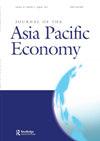Why has inequality in the Philippines declined? A two-stage hierarchical inequality decomposition analysis by location and education
IF 1.5
4区 经济学
Q3 ECONOMICS
引用次数: 0
Abstract
The Philippines has been successful in reducing inequality over the last two decades. This study conducts a two-stage hierarchical inequality decomposition analysis by location and education to explore the determinants of declining expenditure inequality using the Family Income and Expenditure Survey. In the period 1997-2006, falling inequality among urban households with tertiary education is the dominant determinant by explaining 74% of declining overall inequality. In the period 2006-2018, falling disparity between urban and rural areas is the main determinant by explaining 42% of declining overall inequality. Falling inequality among urban households with tertiary education contributed also, but its contribution is 25%. Though expenditure inequality has declined, its level is still very high. To further reduce expenditure inequality, it is imperative to reduce inequality among households with tertiary education. It is also important to reduce inequality between education groups, particularly between households with tertiary education and those with lower education.为什么菲律宾的不平等程度下降了?基于地域和教育的两阶段层级不平等分解分析
过去二十年来,菲律宾在减少不平等方面取得了成功。本研究利用家庭收入与支出调查,以地区和教育为单位,进行两阶段的层级不平等分解分析,探讨支出不平等下降的决定因素。在1997-2006年期间,受过高等教育的城市家庭的不平等程度下降是主要决定因素,解释了74%的总体不平等程度下降。在2006-2018年期间,城乡差距的缩小是主要决定因素,解释了42%的总体不平等下降。受过高等教育的城市家庭不平等程度的下降也起到了一定作用,但其贡献率为25%。尽管支出不平等有所下降,但其水平仍然很高。为了进一步减少支出不平等,必须减少受过高等教育的家庭之间的不平等。减少教育群体之间的不平等也很重要,特别是受过高等教育的家庭和受教育程度较低的家庭之间的不平等。
本文章由计算机程序翻译,如有差异,请以英文原文为准。
求助全文
约1分钟内获得全文
求助全文
来源期刊

Journal of the Asia Pacific Economy
ECONOMICS-
CiteScore
3.70
自引率
7.10%
发文量
58
期刊介绍:
Journal of the Asia Pacific Economy (JAPE) is concerned primarily with the developing economies within Pacific Asia and South Asia. It aims to promote greater understanding of the complex factors that have influenced and continue to shape the transformation of the diverse economies in this region. Studies on developed countries will be considered only if they have implications for the developing countries in the region. The journal''s editorial policy is to maintain a sound balance between theoretical and empirical studies. JAPE publishes research papers in economics but also welcomes papers that deal with economic issues using a multi-disciplinary approach. Submissions may range from overviews spanning the region or parts of it, to papers with a detailed focus on particular issues facing individual countries. JAPE has a broad readership, which makes papers concerned with narrow and detailed technical matters inappropriate for inclusion. In addition, papers should not be simply one more application of a formal model or statistical technique used elsewhere. Authors should note that discussion of results must make sense intuitively, and relate to the institutional and historical context of the geographic area analyzed. We particularly ask authors to spell out the practical policy implications of their findings for governments and business. In addition to articles, JAPE publishes short notes, comments and book reviews. From time to time, it also publishes special issues on matters of great importance to economies in the Asia Pacific area.
 求助内容:
求助内容: 应助结果提醒方式:
应助结果提醒方式:


